Google Pixel 9 Pro XL vs Pixel 7 Pro: two years of evolution!

Intro
Google Pixel 9 Pro XL vs Pixel 7 Pro differences explained:
| Pixel 9 Pro XL | Pixel 7 Pro |
|---|---|
| Evolved design, flatter sides, pill-shaped camera bar | Old style curved screen and soft edges, end-to-end camera vizor |
| 6.8″ Super Actua display, 20:9, 486 PPI | 6.7″ OLED, 19.5:9, 513 PPI |
| Triple camera system | Triple camera system |
| 16 GB RAM / 128 GB to 1 TB storage options | 12 GB RAM / 128 GB to 512 GB storage options |
| 5,060 mAh battery | 5,000 mAh battery |
| 37 W charging 23 W wireless Reverse wireless |
23 W charging 23 W wireless Reverse wireless |
Table of Contents:
Design and Display Quality
Signs of the times
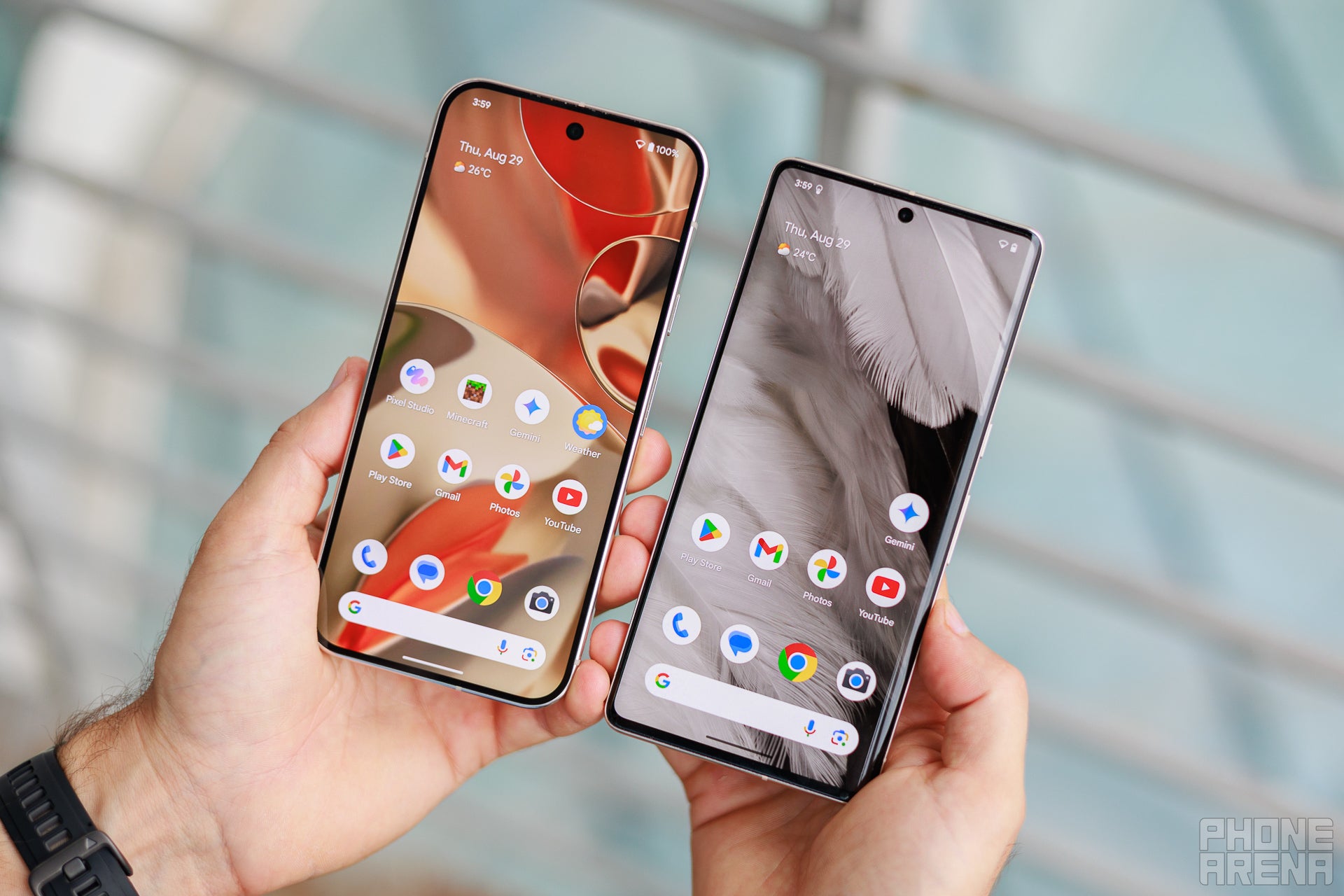

This translates to slight body size differences — but, in general, the Pixel 9 Pro XL is about the same size as the Pixel 7 Pro. It’s a smidgen thinner, but also very slightly heavier. Rest assured that if you are coming from a 7 Pro, you will adjust very, very quickly.
The camera vizors may be different shape, but they serve the same purpose. They won’t let your phone lay flat on a table, but there will be much less wobble, due to the full horizontal length of them. And they can serve as finger rests — those are the positives that fans of the Pixel design will point out. We also have the same hardware controls (being power and volume buttons), and the same under-screen fingerprint scanner.
Worth noting, the Pixel 9 Pro XL‘s face unlock is enhanced and extra-secured with the power of AI. You can now use it to unlock your financial apps, too.
The new Pixel 9 Pro phones come in a quadruple of colors — Obsidian, Porcelain, Hazel, and Rose Quartz. The Pixel 7 Pro was available in Obsidian, Snow, and Lemongrass — Google was taking a lot less risks a couple of years ago!
Both screens are protected by Gorilla Glass Victus — the Pixel 9 Pro XL gets Victus 2 — and have resolutions to ensure super sharp imagery — 486 pixels per inch on the Pixel 9 Pro XL, 513 PPI on the Pixel 7 Pro. And we have IP68 dust- and water-resistance on both devices.
Over the past couple of years, smartphone displays have received quite an upgrade in terms of maximum brightness. As HDR media is becoming more prevalent, manufacturers want to make sure you can browse your Instagram even under direct sunlight. The Pixel 9 Pro XL high 2,000 nits of brightness on our test easily, while the Pixel 7 Pro stops just shy of 1,000 nits.
You can definitely see this in real life — the screen of the 9 Pro XL just pops under any conditions, whereas strong reflections may sometimes prevent your from seeing content on the Pixel 7 Pro.
They are quite similar in their color calibration — we’d say the Pixel 7 Pro is slightly more teal-ish, but the differences are quite minor.
Performance and Software
Tensor G4 is 2 Gs more than Tensor G2!
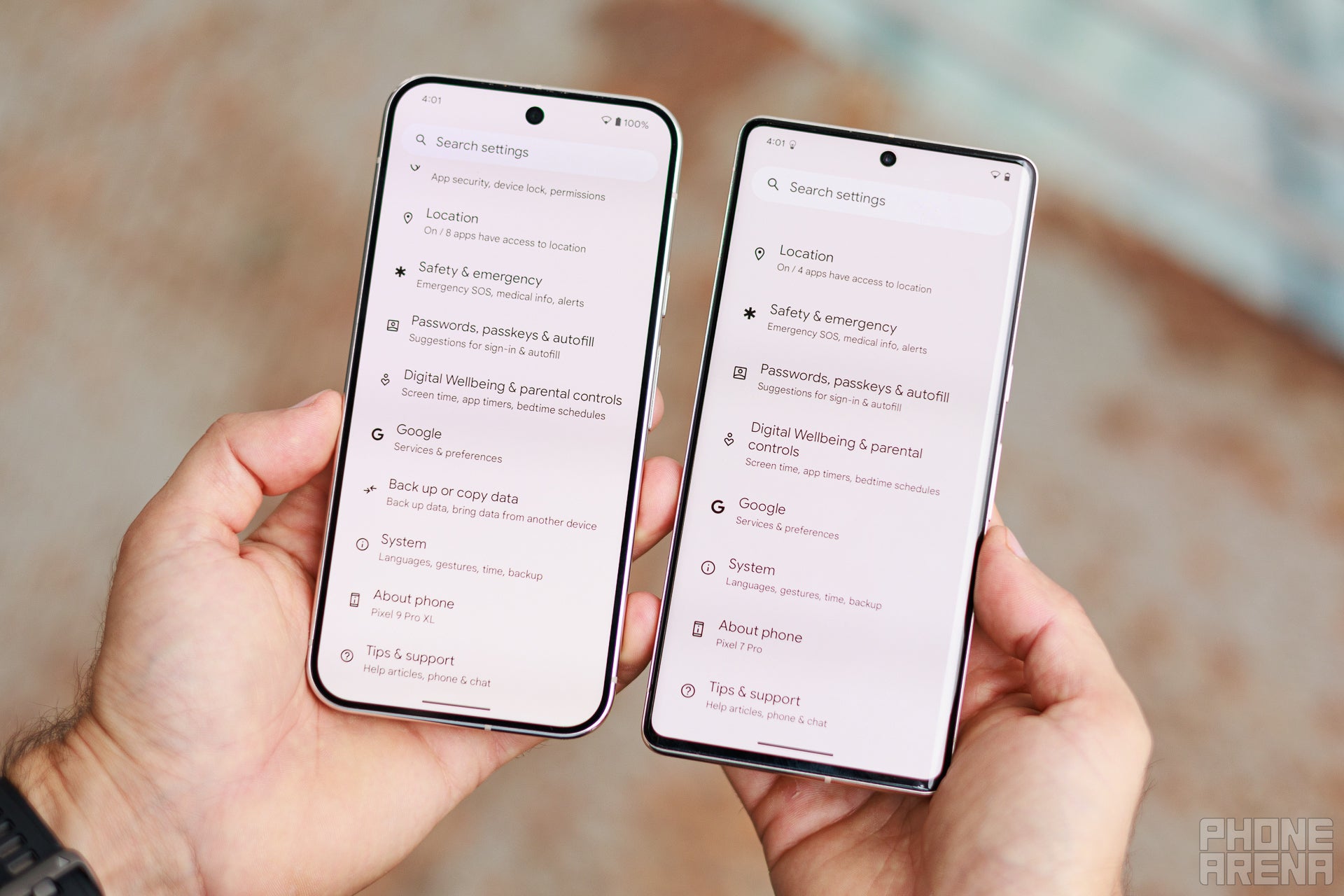

Well, yeah, the Tensor G4 is definitely an upgrade over its two-year-old predecessor. You may be itching for it by now — the new Pixel 9 Pro XL will feel snappier than the Pixel 7 Pro.
But it’s still not on par with contemporary flagship chipsets, at least not in terms of raw performance. Tenor chips put a focus on the image processing pipeline, as well as its dedicated NPU cores for the Google Assistant and now — the AI tricks of Gemini Assistant.
And yes, the Google Assistant will be getting pushed out. The Bard name is also being wiped clean. It seems that Google’s AI will continue on under the Gemini brand, and you get to talk to a Gemini Assistant on your Pixels now. With the Pixel 9 line, we got a slew of upgrades and new features:
- Multimodal integration – you will be able to ask Gemini to pull data from multiple of your Google apps and services and accomplish tasks with them. For example “Find my resume from Drive, summarize it in a paragraph”, or “On which day next week will I be free to go to the movies?”.
- Gemini Live – natural conversations with the Assistant. Interrupt and change topics on the fly!
- Add Me – when taking group photos, take a picture of the group, then swap in with someone else. Pixel AI will be able to stitch a photo as if you were all in it
- Auto Frame – part of the Magic Editor. Will edit and change framing of photos, based on what the AI knows about good photography practices
- Reimagine – edit a photo via text prompt. Type out what you’d like to see and have the AI edit the photo for you
- Video Boost – will upscale video up to 8K resolution. Now works twice as fast
- Weather app – Gemini Nano will now give you a quick summary of weather conditions
- Magic List – ask phone to create complex shopping lists automatically. “Plan a taco dinner for 6, one vegetarion option”
- Screenshots app – use Gemini Nano to quickly recall old screenshots that you once took to remember something. On-device processing only
- Call Notes – comes up after a voice call with a quick summary of your conversation. On-device processing thanks to Tensor G4
We don’t know if and when any of these features will trickle down to the Pixel 8 and Pixel 7 before it. Google was pretty mum about that, but we have to believe that most will be dropped via updates, right? Here are the old Google Assistant features, that are still available across the contemporary Pixel phones:
- Call Screening – Google Assistant will pick up and take a message for you. You see real-time text transcript of the message and can choose to pick up
- Direct My Call – when calling a help line, Google Assistant will show you in text which number to press, so you don’t need to wait for the slow voice instructions
- Hold For Me – when calling a help line, Google Assistant will stay on the call and notify you when someone finally answers
- Voice Message Transcriptions – transcribe voicemails to text
- Best Take – after multiple group photos, choose between the various faces from every shot to compose one picture where everyone looks their best
- Photo Unblur – remove blur from any photo — even old photos, not taken with a Pixel phone
It’s also worth noting that the new Pixels now get seven years of software support — seven major Android updates! The Pixel 7 Pro‘s support will be ending in October 2025! If you own one, don’t expect new updates other than security patches past that date. If you are wondering between a Pixel 7 Pro and Pixel 9 Pro XL right now, as you are reading this — there’s your answer. Not much use in buying a phone that has a year of support left for it, unless you find a mega bargain.
Camera
The most powerful Pixel camera ever
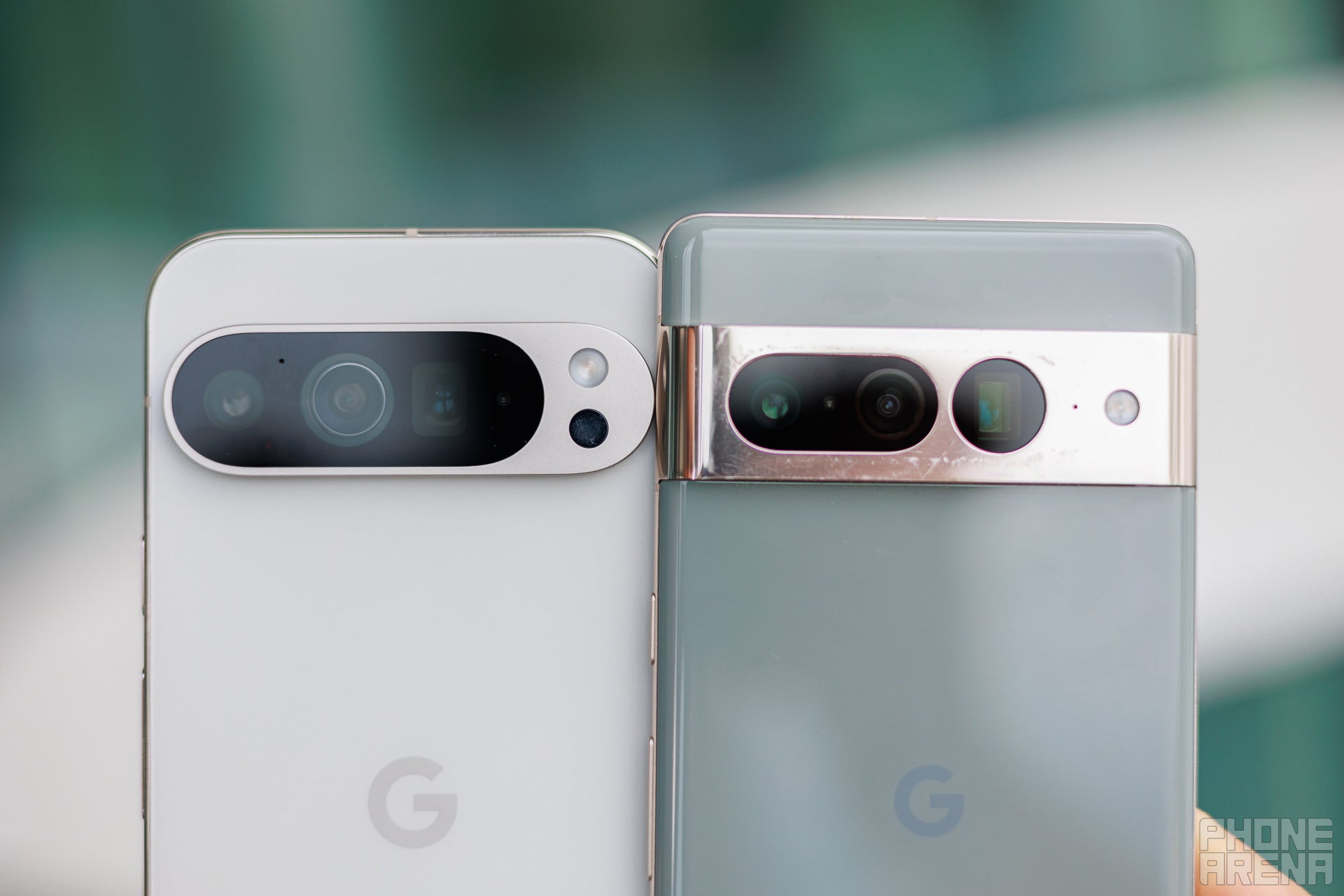

The Pixel 9 Pro XL now gets:
- 50 MP main camera
- 48 MP ultra-wide camera with macro focus mode
- 48 MP 5x telephoto camera
But we are not limited to using those 0.5x, 1x, 5x steps. Pulling an iPhone, the Pixel 9 Pro and Pro XL will give you quick zoom steps of 0.5x, 1x, 2x, 5x, and 10x. Google calls it “optical quality” — this is common practice nowadays where manufacturers leverage the high-quality sensors and lenses to crop into a high-res sensor’s image and use advanced computational photography algorithms to achieve a clear, realistic image.
The Pixel 7 Pro comes with:
- 50 MP main camera
- 12 MP ultra-wide
- 48 MP 5x telephoto camera
It’s still a very competent camera phone — specifically thanks to Google’s postprocessing algorithms, which it has been developing for years. But… you know, we do expect the Pixel 9 Pro XL to do better.
So, here are some samples:
Main Camera
It is pretty awesome how well the Pixel 7 Pro camera holds up today — almost two years since release. Yes, the technology has matured, but Google’s post-processing algorithms are also nothing to snark at.
Between the Pixel 7 Pro and Pixel 9 Pro XL, the biggest difference you will see is that the newer model has a warmer cast on its photos, which we have to say looks more pleasant. When pixel-peeping (ha!), the Pixel 9 Pro XL photos also look softer and more realistic around fine details, while the Pixel 7 Pro destroys indentations, leaves, and grass strands by making them too jagged with its sharpening.
With nighttime shots, we see some surprises. The Pixel 7 Pro is slightly worse at taming highlights around light sources — sure, but in general, its night photos come out more contrast-y, slightly more saturated, and livelier. The Pixel 9 Pro XL gave us slightly green-ish, just a tad washed-out night photos. Also, if there’s any difference in detail in the night samples, the Pixel 7 Pro is the one to have slightly better fine details here. Interesting!
Zoom Quality
Both of these phones have 5x telephoto lenses for zoom, so at 3x — they are both cropping into their main sensors. And here, we can see the new Pixel 9 Pro XL doing a much better job — details are sharper and colors seem more vibrant and realistic, as we assume the phone had less trouble rendering the picture.
At 5x, both are using their zoom lenses with 48 MP sensors underneath — and the results are quite similar, if we ignore the green cast that the Pixel 7 Pro tends to give us.
Ultra-wide Camera
We see similar differences with the ultra-wide cameras as with the main ones — the Pixel 9 Pro XL is slightly warmer, slightly more saturated. But, we also spot the same disadvantages in both cameras — their dynamic range drops and shadows get crushed. Both phones oversharpen details to compensate for an ultra-wide lens’ natural softness.
Selfies
The selfie cameras offer slightly different framing, as the Pixel 9 Pro XL‘s lens is a bit wider. But, on both phones, you have the option to crop-in for a closer selfie. In any case, we can definitely see the upgrades here – the Pixel 9 Pro XL is better at handling dynamics, relistic colors, noise, and finer details.
Video Quality

Video quality is a mixed bag. While the Pixel 9 Pro XL definitely produces sharper clips, they are also weirdly contrasty and cold in a way. Stabilization seems similar on both, but we felt like the ultra-wide camera of the Pixel 7 Pro was actually more stable. When we zoom in, the Pixel 9 Pro XL looks a bit sharper, again, but the Pixel 7 Pro seems to have a slightly wider dynamic range.
At night, the stabilization of the Pixel 9 Pro XL seems to be a bit better, with less jitters — but they are still there. In general, very comparable performance, but that contrasty look from the Pixel 9 Pro XL camera would have us reaching for a Pixel 7 Pro for video.
Battery Life and Charging
Where size matters
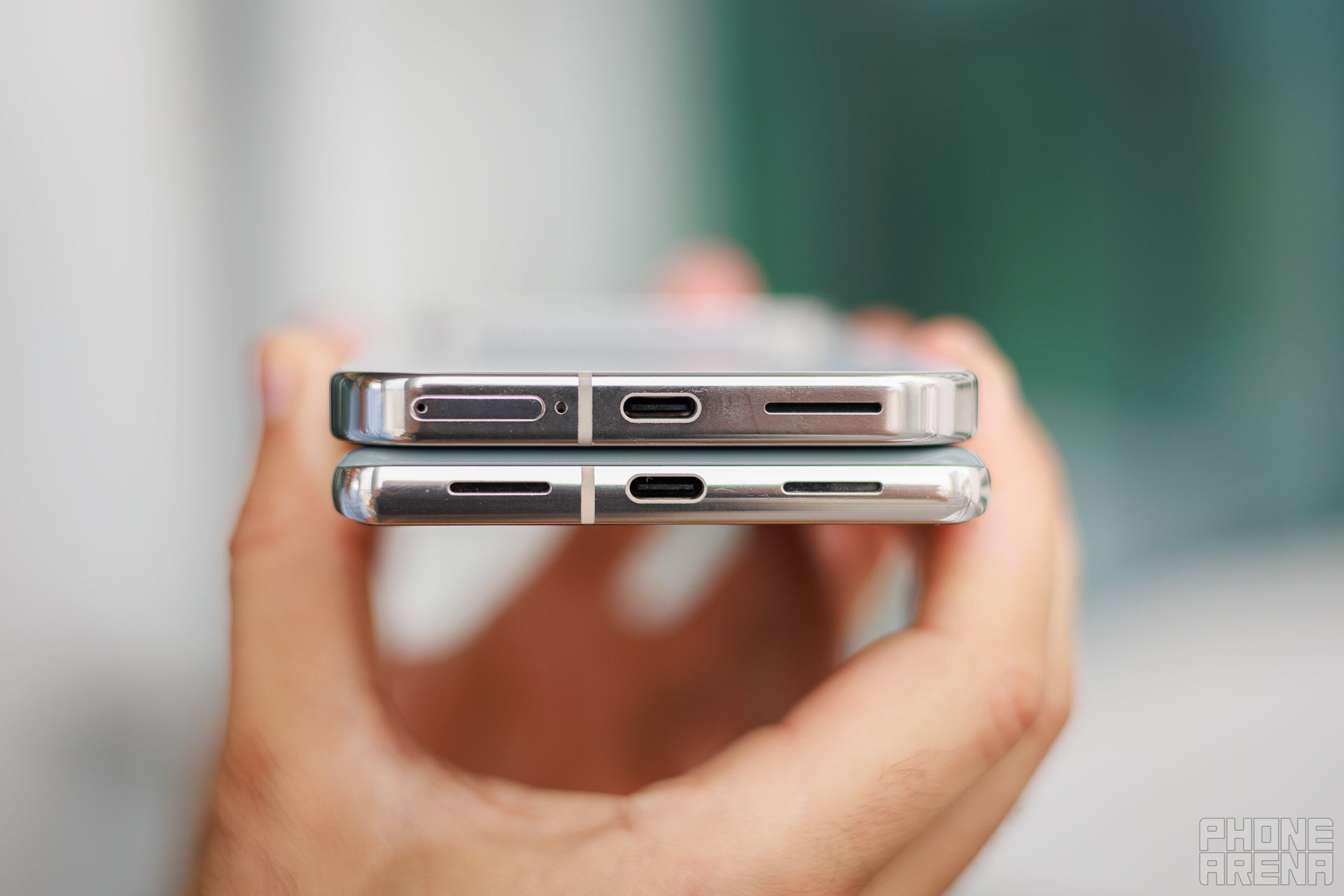

The Google Pixel 9 Pro XL got a tiny upgrade in battery capacity. Specifically, it’s got a 5,060 mAh battery, while the Pixel 7 Pro has a 5,00 mAh cell — pretty standard. But since the Tensor G4 chip is supposedly even more efficient — we expect significant differences in the battery tests. Well, what did we get?
PhoneArena Battery Test Results:
We test the batteries through three different benchmarks — an incredibly long YouTube playlist, a script that reloads and scrolls websites until the phone dies, and a 3D game with all the settings set to a standard. The phone screens are set to 200 nits, which is your a typical indoor viewing brightness.
And yeah, as you can see — the Tensor G4’s promise of efficiency was no joke. While there’s little difference when streaming video, the Pixel 9 Pro XL is definitely much better at surviving long gaming sessions. And it gets a nice 30% boost in web browsing time.
There is also a definite upgrade in charging — the Pixel 9 Pro XL can now draw 37 W on the wire, meaning it should charge from 0% to 70% in 30 minutes — as per Google’s specs. Our test didn’t quite get us that high:
PhoneArena Charging Test Results:
But it’s still an upgrade. While both phones take roughly the same time to get a full 100% charge, if you only have 15 minutes to half an hour to plug in somewhere — the Pixel 9 Pro XL will definitely give you more usable percentages. Combined with the improved battery life — we’d say this category is a definite win for the Pixel 9 Pro XL.
Audio Quality
While the Pixel 7 Pro‘s speakers don’t sound necessarily bad, they are easily outshined by the new drivers in the 9 Pro XL.
Specs Comparison
| Specs | Pixel 9 Pro XL | Pixel 7 Pro |
|---|---|---|
| Dimensions | 6.0 x 2.8 x 0.3 in (152.8 x 72.0 x 8.5 mm) |
6.41 x 3.02 x 0.35 in (162.9 x 76.6 x 8.9 mm) |
| Weight | 221 g | 212 g |
| Screen | 6.8-inch, 1344 x 2992 OLED, 1-120 Hz |
6.7-inch, 1440 x 3120 OLED, 10-120 Hz |
| Processor | Tensor G4 | Tensor G2 |
| RAM, Storage and Price | 16 GB / 128 GB $1,099 | 12 GB / 128 GB $899 at launch |
| Cameras | 50 MP wide, f/1.68 48 MP ultra-wide, f/1.7 48 MP telephoto, 5x, f/2.8 42 MP front, f/2.2 |
50 MP wide, f/1.9 12 MP ultra-wide, f/2.2 48 MP telephoto, 5x, f/3.5 10.8 MP front, f/2.2 |
| Battery Size | 5,060 mAh | 5,000 mAh |
| Charging Speeds | 37 W wired 23 W wireless Battery share |
33 W wired 23 W wireless Battery share |
Which one should you buy?
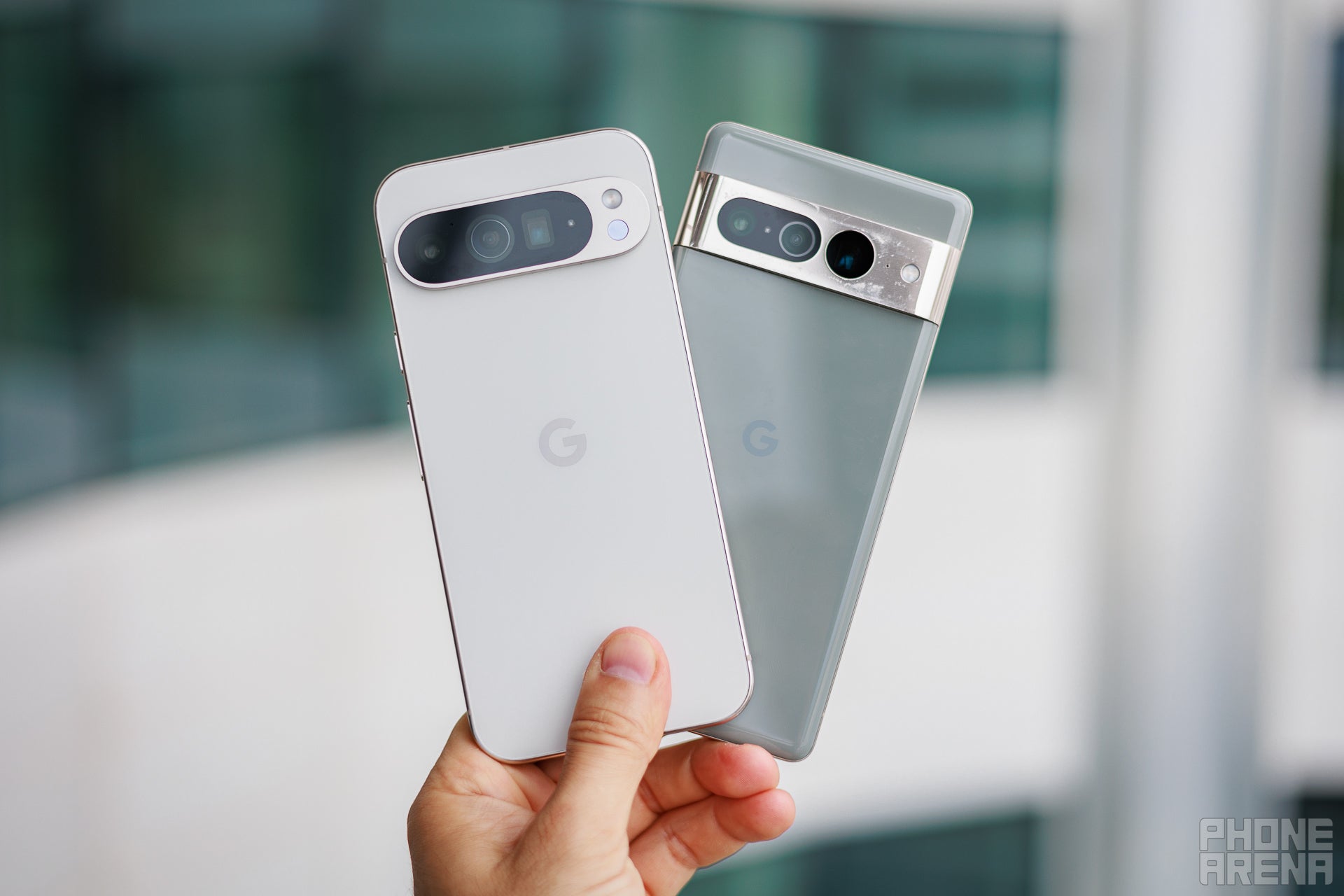

Well, it’s hard to argue that the Pixel 9 Pro XL is a cool, shiny new toy. The Super Actua display is brighter, more vibrant, and just more fun (so was last year’s Actua). The redesign is a breath… ok, a slight quick inhale of fresh air. And the camera — well, it’s a step up in some areas, but weirdly a step down in others.
The new AI features will definitely draw techies who love to be on the cutting edge of that particular tech wave. Though, we are a bit irked at how mum Google is on which features (if any) will be arriving to the older flagships.
If you own a Pixel 7 Pro now, yeah — you are justified to be itching for that upgrade. But if you are wondering whether you can hold on to it for yet another year — we figure you should be fine if you choose so.
If you are just now looking at a deal of an old Pixel 7 Pro, or the new Pixel 9 Pro XL instead… yeah, get the latter. The 7 years of software support alone will make up for it. The Pixel 7 Pro won’t be getting Android updates past next year’s October. If you find one for peanuts and just want to dip your toes in that Google Android experience — then yeah, give it a whirl. The Pixel 7 Pro is still good and will be for a little while.
Source link


